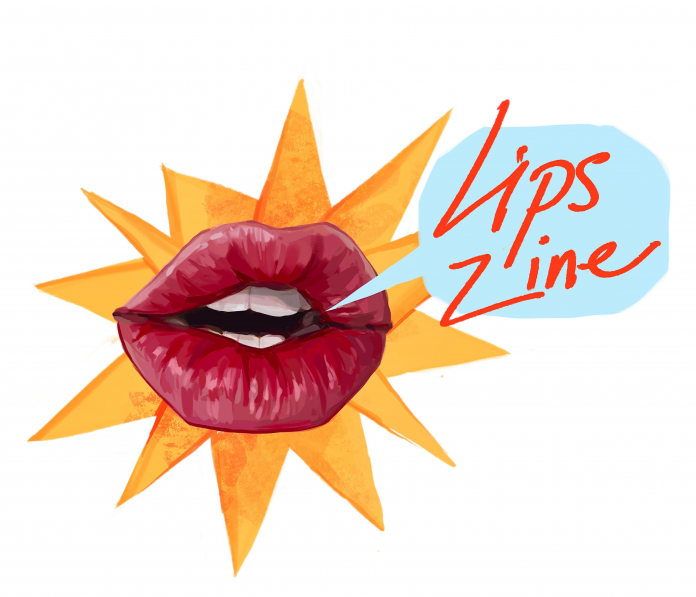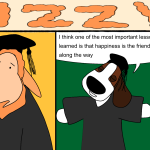From classrooms to coffee shops, students may have noticed the recent appearance of eye-catching fliers promoting the club “Lips.” Multicolored collages of eyeballs and faces shrouded in red mesh are enough to pique the curiosity of passersby. Those who choose to dive deeper will discover a community dedicated to creative thinkers who wish to provide a platform for individuals subject to oppressive systems and norms.
Lips explores the intersections between art and activism while fostering strong relationships among its members. The club seeks to reach the greater College of William and Mary community through semesterly zine publications.
After a several-year hiatus, the organization is back with new and exciting things to offer. Lips was originally founded in 2007 by Annie Brown ’10 as a final project for their Intro to Gender, Sexuality and Women’s Studies class. The project culminated in the publication of a zine dedicated to the empowerment of female sexuality. Eventually, the project turned into a club that remained active until 2013.
Today, co-organizers Joey Houska ’24 and Simmi Cilluffo ’22 have taken up the mantle. Both organizers were made aware of Lips following a presentation given by Brown in the fall of 2021.
“Annie Brown led a workshop where we discussed reinitiating Lips back at William and Mary after a period of dormancy,” Cilluffo wrote in a text message. “Because I work with the GSWS program, I had a lot of resources and information at my fingertips.”
Cilluffo further explained how the duo formed to spearhead the creation of Lips following Brown’s workshop.
“I knew I wanted to restart Lips at William and Mary with the amazing support of the GSWS program, but as a senior who is graduating in a few short months, I knew I couldn’t take on this project on my own,” Cilluffo wrote. “That’s why it was so exciting that Joey joined me.”
Lips serves as both a social club and a zine publication. Before diving into the specifics of the club, it is important to understand what a zine is and how it operates. A zine, by design, is hard to define.
“Zines are meant to be an alternative to mainstream magazines and content in general,” Houska said. “The original Lips was meant to be an alternative to women’s magazines. Ours is more generally an alternative to mainstream media. Zines have a little bit more freedom because of that. We’re meant to deal with niche topics — especially stuff that’s political and personal.”
Houska went on to describe the inherently political nature of zines.
“Zines are a way of saying, ‘we are here, this is us, this is our experience.’ that in itself is kind of revolutionary.”
“They were popularized within the Riot grrrl movement. There is so much history of zines being used for political activism because they’re created by and for diverse communities — especially marginalized communities — it’s meant to document their stories, history and experiences in ways that most mainstream media fail to capture,” Houska said. “If you look back through historical zines, you’ll find stories and experiences of people who aren’t portrayed in academia or in pop culture. Zines are a way of saying, ‘we are here, this is us, this is our experience.’ That in itself is kind of revolutionary.”
Houska and Cilluffo have big plans for the club. Both organizers strive to cultivate a close-knit, inclusive community for marginalized groups to learn from each other. While the zine serves as a way to uplift voices and perspectives through various creative outlets, it is not the only thing the club has to offer.
“During our weekly meeting structures, we usually have a consciousness-raising presentation made by one of our members. Then we do some sort of artistic activity to build submissions for the zine,” Houska said.
Making education and theory accessible is one of Lips’ guiding principles.
“A lot of us have GSWS backgrounds or have experience with Asian and Pacific Islander American studies or Latinx studies,” Houska said. “Since we all have experience with these different departments, we’re trying to give a platform for people to share that and then discuss it. It also allows people who aren’t involved with the department to have the access and the tools to understand how oppression operates and how our personal experiences are political.”
One of Lips’ first student-led presentations was facilitated by Pelumi Sholagbade ’24. Their presentation, “Aint I [I Aint] a Woman: Race, Gender and Sexuality,” centered around their personal experience as a queer, Black and nonbinary individual and how that impacts their life.
“I was just like, ‘oh, I can talk about race, gender and sexuality, those are three things that are relevant to my day-to-day experience,’” Sholagbade said. “When I started putting my presentation together, I thought, ‘wow, I actually have the opportunity to articulate a lot of what I think people don’t understand about the nuances and relationships of those things, especially based on my perspective as a Black, queer woman.’”
Sholagbade drew much of their inspiration from their favorite thinkers, most notably Angela Davis. The title “Aint I [I Ain’t a Woman]” draws from Sojourner Truth’s speech “Aint I a Woman?”
“For the presentation, I was trying to draw a through-line between the institution of slavery and how that impacted Black people in general and Black people socialized as women specifically,” Sholagbade said. “I wanted to find that connection between the stereotypes and the expectations that we see for Black women in the modern day.”
Using creative expression as an avenue for sharing poignant messages, as exemplified by Sholagbade, is a vital aspect of Lips.
“Zines are all about creating a space and a platform to work through how society impacts you as an individual.”
“While we do accept and encourage both written and visual pieces of art, creating and expressing oneself is really central to what we’re about,” Houska said. “Zines are all about creating a space and a platform to work through how society impacts you as an individual.”
Houska further highlights the benefits of facilitating the creation and spread of art.
“I think that art is one great way to make some of these big themes more accessible,” Houska said. “Art is a way of having those internal conversations with ourselves and then opening up that conversation to the broader William and Mary community.”
Though Lips is currently focused on weekly workshops and a semesterly publication, Lips plans to revamp past traditions from the original Lips group by hosting a number of events like drag shows, slut walks, sex education workshops and body image seminars.
“This semester, we’re mostly working on becoming a formal organization and then just building the zine itself,” Houska said. “But those are things that we definitely want to do because this is as much of a social community as it is a publication. We’re excited to do a drag show for sure next year and hopefully some sort of auction or other fundraising event.”
Maintaining the original framework of Lips is important to Houska and Cilluffo, who continue to maintain close contact with Lips’ founder. Many elements of the current club honor Brown’s original vision. However, Houska and Cilluffo do not shy away from incorporating their own ideas into current and future programs.
“The original publication focused on female sexuality specifically and then that opened up to non-traditional sexuality to be more inclusive,” Houska said. “We’re not just focusing on sexuality exclusively. While that’s something that we do value, and we’re trying to promote a sex-positive environment, we want each zine to be about the experiences and the interests of the people in the club at that time. Zines are a very timely thing. They’re meant to capture a moment and certain individuals and their experiences. There’s a little bit more fluidity and a bit more freedom in terms of where we can take each publication.”
Lips is still in its early stages; however, the extent of the club’s impact should not be underestimated. The club continues to attract passionate individuals dedicated to uplifting their own stories and the stories of those around them.
“Lips is more than a zine; it’s a space for learning, growing and acceptance.”
“I can tell that Lips will be a lasting group on campus,” Cilluffo wrote. “I feel so grateful that before I graduate, I got to be involved in creating an inclusive space on campus that emphasizes LGBTQ+ identities. Lips is more than a zine; it’s a space for learning, growing and acceptance.”
Lips will continue to accept submissions for their Spring 2022 issue until April 13. The club meets every Wednesday at 8 p.m. in Boswell 314.
CORRECTION (04/06): A previous version of the article had the incorrect pronouns for Annie Brown, article has been updated to reflect correct pronouns.


































